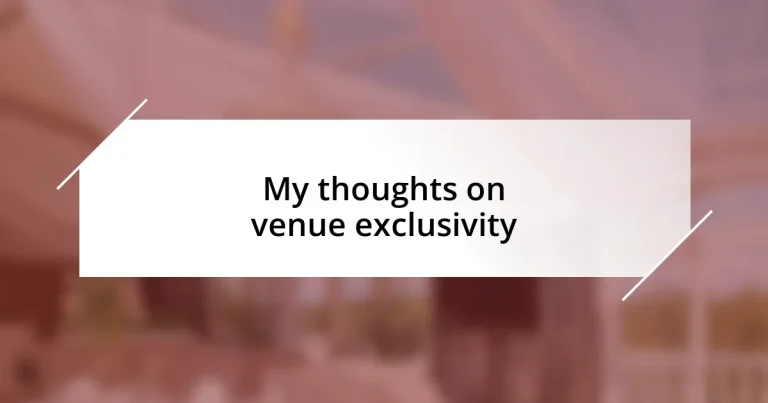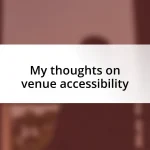Key takeaways:
- Venue exclusivity enhances the event experience through control over the environment, improved service quality, and a sense of prestige.
- Drawbacks include high costs, underutilized spaces for smaller gatherings, and added pressure to meet expectations.
- Effective negotiation involves clear communication about budget and priorities while being transparent about exclusivity needs.
- Thoroughly review venue contracts for legal implications and ensure understanding of liability and insurance requirements to avoid unexpected complications.
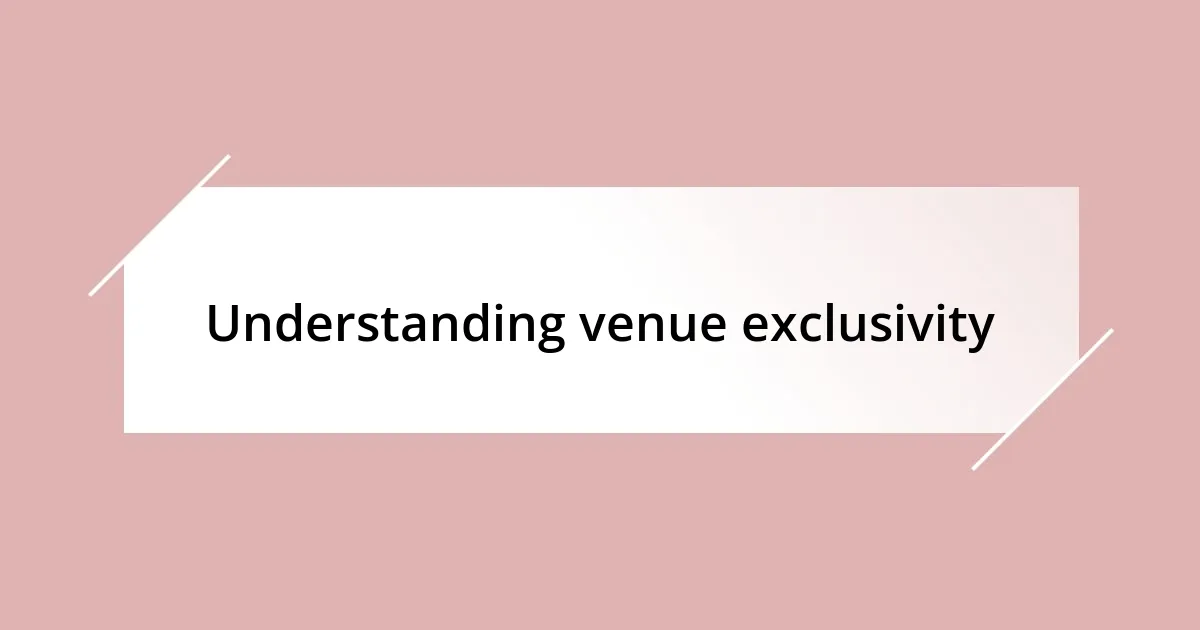
Understanding venue exclusivity
When I first encountered the concept of venue exclusivity, I was surprised by its popularity among event planners and couples alike. It struck me as a decision that could shape the entire atmosphere of an occasion. Consider this: would you prefer to share a stunning location with several other events, or enjoy the privacy and unique charm of having it all to yourselves? There’s a certain magic that comes with exclusive access, isn’t there?
I once attended a wedding at a venue that was completely reserved for the event. The feeling of intimacy was palpable; every guest truly felt like they were part of something special. It made me reflect on how exclusivity not only elevates the experience but also fosters a deeper connection among attendees. In my experience, when people feel that a place is reserved just for them, the memories created are often more cherished and lasting.
However, exclusivity comes with its own set of challenges. It can be tempting to choose a highly sought-after venue, but I’ve learned that it’s essential to balance desire with practicality. Have you ever wondered if the added cost of an exclusive venue justifies the benefits? In navigating this decision, I realized that it’s crucial to weigh personal values against the logistical implications, ensuring that every dollar spent enhances the experience without overshadowing it.
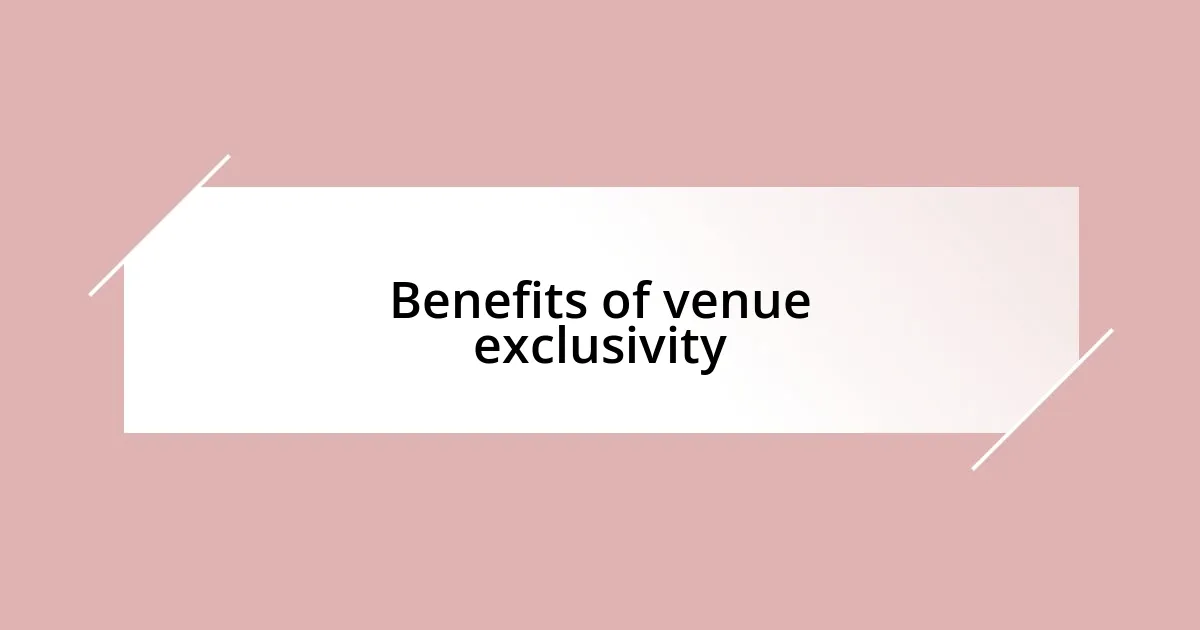
Benefits of venue exclusivity
Venue exclusivity offers numerous benefits that can significantly enhance the overall experience of an event. For instance, having a venue all to yourself means complete control over the environment. I remember planning a corporate retreat at an exclusive location; the flexibility to customize the layout and decor was a game changer. There’s something liberating about knowing that no unexpected guests will crash your event, allowing everyone to relax and enjoy without distractions.
Another advantage is the improved service quality. Exclusive venues often provide dedicated staff who focus entirely on your event. I’ve experienced this firsthand; at a boutique venue, the attention to detail was extraordinary. The staff anticipated our needs, which made the event flow seamlessly. When you know that the venue’s team is solely focused on your occasion, it elevates the overall experience immensely.
Let’s also consider the aspect of prestige. An exclusive venue can provide a distinctive backdrop that enhances the significance of the occasion. I once attended a milestone birthday celebration at a historic estate that was reserved just for us. The combination of an exceptional setting, alongside the exclusivity, created an atmosphere that felt luxurious and memorable. This influence on how guests perceive the value of an event cannot be understated.
| Benefit | Description |
|---|---|
| Control Over Environment | Complete customization and privacy for a more tailored experience. |
| Quality of Service | Dedicated staff focused solely on your event enhances flow and enjoyment. |
| Prestige | Exclusive settings create a memorable backdrop, elevating the perceived value of the occasion. |

Drawbacks of venue exclusivity
When I think about the drawbacks of venue exclusivity, the first thing that comes to mind is the financial burden it can impose. Exclusive venues often come with a hefty price tag, which can strain budgets, especially for those planning events on a tight budget. I remember a friend who had her heart set on a prestigious location, but the cost of exclusivity forced her to cut corners in other areas. Watching her grapple with that decision was a reminder that prioritizing impressiveness over practicality can lead to stress rather than joy.
Alternatively, there’s also the possibility of feeling a bit isolated. While having a venue all to yourself seems enticing, it can sometimes feel overwhelming to fill such expansive spaces, particularly for intimate gatherings. During my own small family reunion at an exclusive place, I noticed the venue’s vastness created an emotional disconnect among us. It wasn’t until we moved to a cozier part of the venue that we truly felt connected once more.
Here are some drawbacks to consider:
- High Costs: Exclusive venues can significantly increase event budgets, impacting other important aspects.
- Space Utilization: Large venues may become underutilized, making smaller gatherings feel sparse or impersonal.
- Limited Availability: Popular exclusive venues might be booked well in advance, limiting choice and flexibility in scheduling.
- Increased Pressure: The expectation of exclusivity can create added stress on hosts to make everything perfect, potentially overshadowing enjoyment.
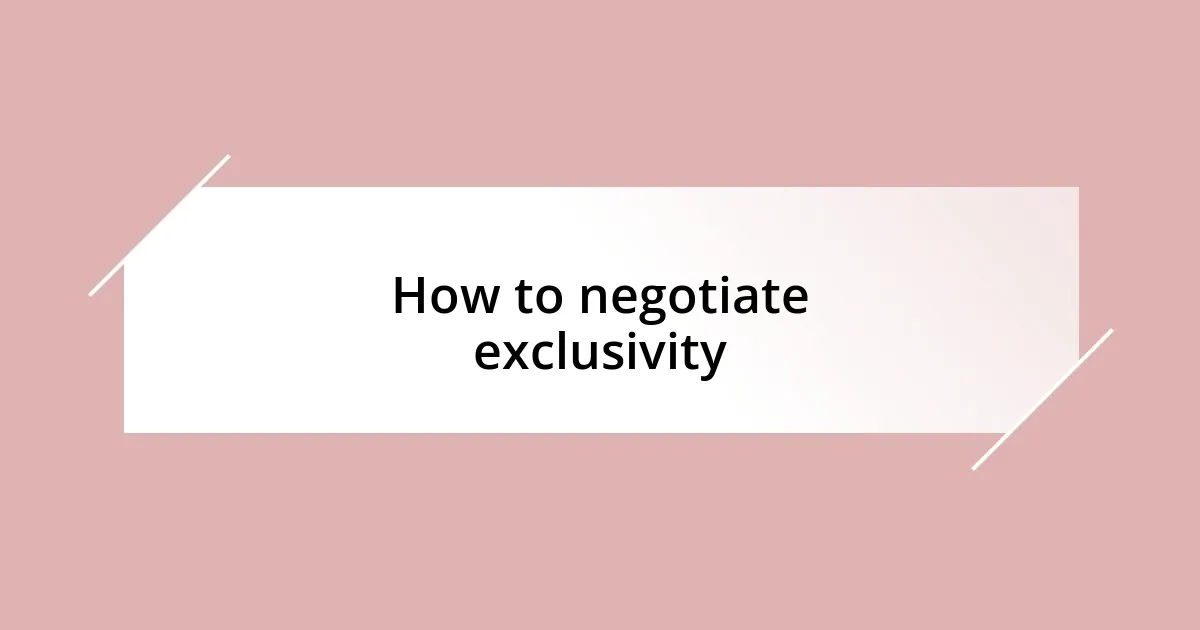
How to negotiate exclusivity
To effectively negotiate exclusivity, start by understanding the venue’s value and your own priorities. This requires thorough research and an open dialogue with the venue manager. I once approached a venue owner with a list of specific requests alongside evidence of past successful events, which helped me convey that I was serious and informed about my needs.
When discussing terms, be transparent about your budget and event goals. It’s common to feel apprehensive about revealing financial constraints, but from my experience, this honesty often opens doors. I remember a time when sharing my budget allowed a venue to propose creative options I hadn’t considered, such as tiered pricing for different exclusivity levels that still aligned with my vision.
Lastly, don’t hesitate to ask about flexibility in their exclusivity policy. I learned that sometimes, venues might be more willing to negotiate than you think. A friend of mine managed to secure an additional hour of access at no extra cost simply by asking, which made her event even more enjoyable. Could this kind of open communication make a difference for your upcoming event? It certainly has for me!
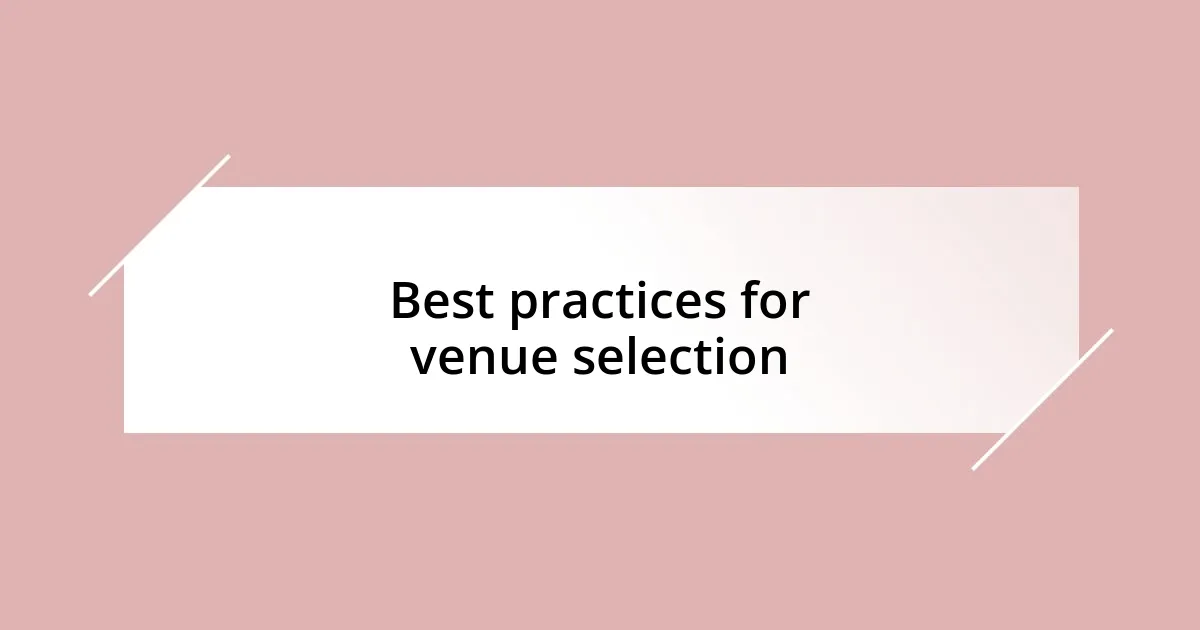
Best practices for venue selection
When it comes to selecting the best venue, I always advise considering the atmosphere that aligns with your event’s goals. Picture this: choosing a vibrant space for a celebration versus a more subdued setting for a corporate meeting. My own experience taught me the importance of matching the venue’s vibe with the type of event I wanted to create. I once selected a trendy loft for a product launch, leading to an energetic environment that perfectly catered to our brand. Did I achieve my vision? Absolutely!
Another crucial aspect is accessibility. If your guests struggle to reach the venue, it can put a damper on the event’s success. I vividly recall hosting a birthday party in a beautiful but remote location. Despite the stunning backdrop, many friends couldn’t attend due to transportation issues, which was disheartening. In hindsight, ensuring the venue was easy to reach would have saved me that disappointment and created a more inclusive atmosphere for all.
Finally, never underestimate the power of visiting potential venues in person. A space can look amazing in photos, but being there in real life reveals so much more. I remember stepping into a venue that seemed perfect online, only to find it felt cramped in person. That experience solidified my belief that a physical walkthrough is essential. It allows you to envision the layout, lighting, and overall vibe, helping you make an informed decision. Wouldn’t you agree that being there can shape your understanding of a space in ways photos just can’t capture?
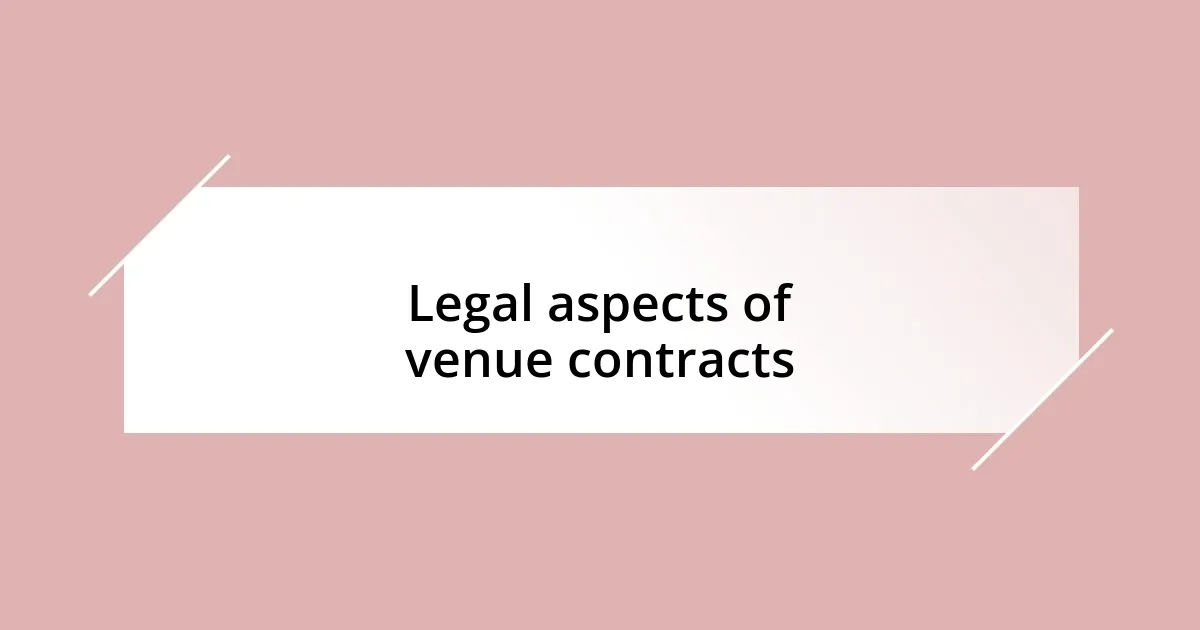
Legal aspects of venue contracts
When engaging with venue contracts, I always find it crucial to carefully read the fine print. This section often contains specific legalities regarding exclusivity that might not be immediately clear. During one of my previous events, I encountered an unexpected clause about cancellation fees that really caught me off guard. Have you ever faced something similar? Understanding these terms beforehand can save a lot of stress later.
It’s also important to discuss liability and insurance requirements. From my experience, some venues require you to provide proof of insurance, which can feel overwhelming. One time, I secured a fantastic location only to realize I needed a policy that extended coverage for the event. This experience taught me that proactive communication about these expectations is essential for a smooth planning process. Why risk complications when clarity is just a conversation away?
Lastly, I recommend always having a legal professional review any contract before signing. I learned this the hard way after I hastily agreed to a contract without fully understanding the implications. A simple oversight in a cancellation policy once led to a significant financial loss for me. Having a lawyer look over the terms could mean the difference between a successful event and a costly mistake. Isn’t it better to be informed than to face unexpected hurdles down the line?

Making informed decisions on exclusivity
When pondering exclusivity in venue contracts, I can’t help but recall a situation where I chose an exclusive venue for a wedding. Their promise of sole access sounded magical, but I later discovered that it came with limitations around catering options and decor. Have you ever found yourself in a similar predicament? It’s crucial to weigh the pros and cons—sometimes, exclusivity can restrict your creative vision.
Additionally, I’ve learned that discussing exclusivity upfront can lead to a more satisfying partnership. In one case, I was caught off guard by a venue’s insistence on exclusive vendors for certain services. This felt limiting at first until I realized the benefits of working with their recommended partners. It turned out to be a delightful collaboration that added unexpected charm to the event. Have you considered how exclusivity might affect your overall experience?
Moreover, being aware of the potential hidden costs associated with exclusivity is vital. I remember budgeting for a venue that was marketed as exclusive, only to find out later that there were surcharges for every additional service. The surprise hit hard, teaching me a valuable lesson about transparency and thorough budgeting. It’s easy to overlook these details in the excitement of planning, but wouldn’t it be better to ask the right questions proactively than to face unwanted surprises later?












